How much should Christians care about “general” religious freedom? Should we just leave it for secular politicians to figure out? Without the Christian voice at the table, what exactly do you think they’re going to “figure out”?
Last week I was in Washington DC to speak at the International Religious Freedom (IRF) Summit 2024.
It’s probably worth noting that, contrary to the image above, the event did not actually take place at Capitol Hill - but I thought the photo worked better than the Washington Hilton, where it actually took place. (More on a controversy related to both venues further below…)
Whilst there I did enjoy a day in Washington, of course, in which I certainly admired the view of places like Capitol Hill, the White House, and that strange Egyptian obelisk known as the Washington Monument (which looks far more impressive when you’re stood at its base than when you see it from afar). Washington is an interesting but also rather strange place, not least in times like these.
The Summit, Religion, and Politics
I had not actually heard of the IRF before I was asked to speak at it. It turns out it’s quite a big deal. There were over 1,600 people there, with all sorts of sessions, panels, stands, and discussions. Although it was a general “religious” conference (the conference hall included stands from Muslims to Scientologists!) it seemed like there was very much a critical mass of Christians behind it all, including the leaders.
So, whilst the Summit certainly had the overt remit to show solidarity with de-humanised peoples of “any faith”, my general experience was meeting Christians representing charities and ministries - large and small - from pretty much all over the world, many of whom have faced (or are facing) very significant persecution for their faith.
Over the course of the two-day conference I found myself in lively conversations with, among others: church-planters from Mongolia; an ex-CIA and ex-Navy Seal who rescues children from warzones; the national chaplain of American Airlines; a German MP (one of the only conservative evangelical Christians in the Bundestag); a Byzantine priest from Canada; the President of the Universal Peace Federation; the Minister of Transportation and Communication for the Kurdistan Region Government of Iraq; and a national representative of persecuted Christians in Nicaragua.
There were also numerous plenary speakers with a high profile in politics, such as the former US Vice-President, Mike Pence, and the current Speaker of the House of Representatives, Mike Johnson, both of whom are well known as conservative evangelical Christians - in Johnson’s case, controversially so. Secular politics is usually happy for Christians to be Christians, it seems, as long as they don’t believe the Bible too much. That’s when it gets tricky.
This global congregation of politicians, writers, ministers, and public figures reminded me a little of the NatCon conference I attended last year, which raised similar questions over the relationship between the Church and politics. In the very nation that’s famous for its “separation of Church and State”, it’s well known that religion (particularly, Christianity) plays a far more prominent role in American politics than within British politics, even if (for some) “God” now seems to be back in fashion (for now).
It’s difficult to get politicians to care too much about religious freedom among the many competing priorities of government. Yet one thing the conference kept emphasising was that countries with greater religious freedom tend to be safer and more prosperous in other ways.
i.e. This is no mere “fringe” issue for religious types; it really does have knock-on effects upon everything else within that nation. Where religious freedom flourishes, human society flourishes, including even its economic prosperity. Conversely, where religious freedom is violated, human society is violated.
Schism at the National Prayer Breakfast
Many delegates from the Summit were also staying on for the National Prayer Breakfast the following day. This was also taking place at the Washington Hilton, where they were to be addressed by the President, attended by many dignitaries from around the country and around the world. This is a fascinating tradition that’s been running since 1953, always held on the first Thursday in February. I hadn’t realised quite how significant it was, nor quite how many opponents and “complexities” this event had caused.
I went to a related open house event the following day held by a conservative Christian organization known as “The Fellowship”. It is they who have been running the prayer breakfast over the years, as well as hosting Christian events, prayer, Bible studies, and retreats for all sorts of leaders for several decades. What I did not know at the time was that this was actually the first year in which The Fellowship is no longer allowed to organise the National Prayer Breakfast.
So, now there are two parallel events - the smaller “official” prayer breakfast run by a new committee and held at the US Capitol (where the President speaks), and the larger “unofficial” prayer breakfast, still held at the Washington Hilton, where it had been held since the 1980s.
It has been said that this “schism” occurred merely “for practical reasons”, that it was just “easier” for the busy statesmen, saving them the journey to get across town to the hotel. But clearly, from various hit pieces on the subject, it seems fairly obvious that this change of direction evidently has a lot more to do with the conservative Christian nature of The Fellowship. Clearly it’s no longer “the done thing” to have conservative Christianity seeming to exert too much influence upon a nation - even when it comes to prayer!
I couldn’t help but notice the irony - in light of the IRF conference in the very same hotel - that The National Prayer Breakfast (which ought to exist to alleviate religious persecution) now seems to be the perpetrator of religious persecution against its own. Again, it is not that The Fellowship are not allowed to “profess Christianity”; it’s that they are not allowed to profess the kind of Christianity the progressive secularists don’t like. Secularism prefers their own governmentally “sanitised” version of Christianity instead. 1970s China comes to mind.
Is “Religious Freedom” a Christian Concern?
Some of my more pharisaic detractors on Twitter/X decried my apparent hypocrisy for attending such a conference at all, given my critique of anti-Christian beliefs and Christian compromise in general, given there would be a mix of religious pluralists, Muslims, liberal Christians, and even a handful of atheists(!) present.
The interesting thing about the conference was, as I expected, that most people did not agree on a great many things, and were not expected to. The point was to gather around the socio-political problem of the curtailment of religious freedom across the world. This is precisely why there was a mix of politicians and corporation leaders as well as religious leaders.
It is a problem, of course, when religious freedom is seen as all-inclusive. You can’t really be pro-Christian, pro-Muslim, pro-LGBT, and pro-atheist simultaneously! Religious freedoms overlap and contradict in complex ways, and I often found myself needing to filter out some of the more idealistic globalist comments from the front, as though if everyone just held hands together and looked after each other’s freedoms, the kingdom of God would arrive from on high, irrespective of who each of us think God is (or isn’t!).
But whilst you cannot affirm all religious beliefs simultaneously, you can take a collective posture of valuing freedom simultaneously. And it is Christian civilizations which have, without question, been ahead of other religious societies to guarantee more freedom even for those with non-Christian beliefs. This is probably why there was such a critical mass of Christians at the conference. There’s a reason Christians care about freedom. It comes attached.
Religious Pluralism and Religious Freedom
Even if a small minority of these Christians were in danger of drifting into pluralistic groupthink, a greater majority were very conservative in their Christian beliefs and - emanating from those Christian beliefs - were inspired to limit the curtailment of other people’s freedoms, as fellow human beings.
As Mike Johnson said in his speech, it is not governments which give people freedom and dignity, it is God, in whose image all people were created. Indeed, because all humans are made in God’s image, they are automatically bestowed human dignity whether they like it or not, and whether they believe it or not.
In any case, Christians are called to mission, are we not? And can this not be part of our mission? More specifically, might it not even become an opportunity for genuine evangelism to those with divergent beliefs from ours? If so, and if we truly wish to be salt and light in this strange world of ours, then such events are certainly not spaces for Christians to vacate.
This is not to say there are not certain kinds of conferences (like certain kinds of “weddings”) which would be unwise to attend, such as where one’s participation would implicitly signal a celebration of all that it stands for. Conferences like the IRF are clearly more about seeking to make the point that religious persecution is a bad thing, and something needs to be done about it.
Indeed, to quote a profane but striking comment from the IRF director Sam Brownback from the stage: “This crap’s gone on for far too long!” We may not all use the same words, but we can certainly resonate with the very true sentiment. The horrors of totalitarian oppression in the twentieth century should never be too far from our memory. And if heinous events like the Holocaust do not stir our souls to action, what will?
A Cluster of Persecutions
To my shame, I had no idea there is currently significant totalitarian persecution of Christians in Nicaragua. We heard from several pastors who spoke of how their sermons are now recorded and police wait outside churches on Sundays to monitor (and photograph) those who go in and out. Numerous Roman Catholic and evangelical pastors are currently in prison for saying the “wrong” thing.
As many noted, such heavy-handed violations of free speech we see in Nicaragua does not occur overnight. It is the fruit of allowing other kinds of discriminatory speech to go unchallenged. As one panellist insightfully noted: “All violations begin with words”.
In fact, it is often noted that the relative international silence over the Armenian genocide - in which the Ottoman Empire murdered well over a million people under the cover of the First World War - became an “inspiration” for Adolf Hitler’s mass genocides during the Second World War. On this note, it’s also worth remembering that nine out of ten genocides occur to religious minorities. A sobering thought.
Sometimes, of course, it’s difficult to disentangle “religious” enemies from “political” enemies. In Ukraine, many evangelicals are seen by the Russian Orthodox Church as “American spies” or members of an insidious “cult”. This (often ignorant) ostracisation of genuine faithful believers is something Christians can ill afford in times like this, where unity against greater foes is the need of the hour.
One of the most bizarre interpretations of religious persecution related to the persecution of Christians by Fulani Muslims in northern Nigeria. This has resulted in the destruction of 17,000 churches since 2009 alone! But can you guess what reason is now often given for this…?
Apparently the root cause of this persecution has little or nothing to do with the nature of Islam; it is the result of (wait for it…) global warming! This is apparently what catalysed the migration of the Fulani people further north from southern Africa in the nineteenth century, and is thus seen as the substantive reason for why the persecution occurred. Well, that’s certainly one way of interpreting it!
One Nigerian pastor at the conference, was visibly angered by this distractive ideological posturing, saying: “This is not about climate change; it is Jihad!” He also added, chillingly: “If I said what I say to you now in Nigeria, they would come for me. They would kill me.”
It’s easy to forget, sat in comfortable chairs in a well-lit, well-heated, well-furnished conference room at a Hilton hotel in the all-powerful city of Washington, that not all the voices at this conference were high status western elites. For a great deal of them, this conference was a totally different environment to what they will be going back to at home. This is one of the reasons why summits like this - mixing with those with more socio-political influence - really are important to raise global awareness of some of the worst problems.
One final thing to note before I get to my panel, was an observation about American time management and punctuality, which is indeed a thing to behold. All the sessions were run with very strict time discipline, with speakers regularly being cut off mid-flow however eloquently they happened to be waxing.
Yet this instinct to “keep moving” was jarring too at times. I observed that in two separate sessions a non-western speaker, when talking about specific instances of severe persecution in a nation and proposed “a moment’s silence” to remember the persecuted Christians there.
Both times I saw this happen, the chair of the session agreed (which was surprising). And yet such a “moment” would last for literally no more than two seconds. You could barely close your eyes before the session chair moved everything on again in order to keep the session “to time”. It was quite remarkable to witness. These were moments in which that very American desire for punctuality (which literally means “to the point”) entirely missed the point.
Progressive Violations
“Violations” seemed an appropriate title for the panel I was speaking on, not least given the way it has been received by some in the aftermath.
I began with a brief presentation, where I shared my situation regarding my dismissal from Cliff College, and how I was aware there would be people there who disagreed with my stance, not least because of the emotive power of issues surrounding sexuality, and how I had hoped we could get into some respectful disagreements about it with whoever had different opinions later on.
I shared how, just the previous day at the conference, someone I’d just met had asked me what I did for a living. When I said I has been fired “for speaking out on the same-sex marriage thing”, he said, “Good on you!” I then replied, “Well, hang on…you don’t know what side I was on…” It turns out he was on the affirming side, and had several LGBT+ family members. The conversation suddenly got very awkward very quick.
Nonetheless, whilst the majority of people appeared to be in lively agreement with me, I do recall six or seven people walking out at particular moments when I said particular things. For many, it seems increasingly the case that dialogue is not the preferred option of disagreement.
The dialogue on the panel itself, however, was excellent. I heard insightful contributions from Andrew Bennet (of Cardus, a conservative think tank) challenging the new power centres of cultural Marxism and the myth of secular neutrality; Paul Teller (of Advancing American Freedom) reflecting on the ongoing need to call out antisemitism in the US; plus various Orwellian warnings on anti-Christian police activities from Elizabeth Francis (of the Alliance for the Defence of Freedom).
Opponents may say our discussion was only congenial because we all shared a similar socio-political viewpoint on these issues, “from the Right”. But if that is indeed the case, it is only because the violations in our time tend to occur “from the Left”, which in our time still holds the keys to cultural power.
Progressives in universities can talk all they like about caring for the oppressed and marginalised, but they often fail to realise how it hasn’t taken them very long at all to become the new oppressors of those they still deem to be the oppressors. More on this further below.
There were various positive write-ups of our panel by religious news outlets such as The Washington Stand, Anglican Mainstream, and Decision (of the Billy Graham Evangelistic Association), many of which accurately captured the tenor of what we were emphasising in terms of the vital importance of maintaining conviction in the face of persecution.
Naturally, there were also less-than-positive interpretations of the panel too. I recently discovered I was accused by one progressive news outlet of being a Far-Right hate extremist (but what’s new?). This was based on an analysis article by another charming organization called the Southern Poverty Law Centre, a legal group that seems to enjoy castigating conservatives for saying conservative things, as though such things are inherently shameful and abhorrent.
In the article, the SPLC not only demonised me and the groups associated with the panel, but they referred to the genuine concern expressed over weaponised “anti-hate speech” laws in the west (such as the case of Isabel Vaughan-Spruce) as “conspiracies”. Well, if talking about violations of religious freedom out in the open at an international conference attended by the press is now a “conspiracy” then call me a conspiracy theorist! All the more reason for us to be shamelessly Biblical, I say.
It would seem that as soon as progressive activists see you as “the enemy”, they don’t tend to think twice about wishing to see you utterly ruined or eradicated. And they seem to have no qualms about entirely contradicting what they profess to believe in as they slander you. Here’s one brief example of the kind of logic that emanates from the ideology of totalitarian “inclusivity”:
It ought to be astonishing that those who most champion tolerance are so often the most willing to dehumanise the “other”. We are not in a time in which discussions about these things can occur rationally or persuasively, try though we might (and we should). The entrenched ideological lenses refuse to see things any other way. They have no ears to hear.
Re-founding America
I even noticed such ideological lenses on my day off whilst looking around one of Washington’s famous Smithsonian museums: The Museum of American History.
Wandering through, it struck me how truly astonishing it is to think of the history of America, of all it stood for, all it has achieved in the world; all the risks, the convictions, the courage, the enterprise, the ambition, the sheer audacity to overcome challenges that seemed insurmountable. Even with all the negative byproducts of such enterprise in the onset of modernity, there is an overwhelming amount of good things to appreciate in America’s legacy.
And yet, walking around the various exhibits, it seemed obvious that much of this is now tainted with self-invoked shame. Every third paragraph I read seemed to be a reminder about the horrors of slavery, or the duplicitousness of segregation and capitalist greed, often in sections of exhibits where you really wouldn’t expect such a comment to be made.
Rather than having specialised exhibits for raising awareness about the darker side of their national history, it seems to have been preferred that these issues are allowed to work their way into everything, so that it becomes effectively impossible to learn about any one aspect of American history without thinking about these contradictory downsides at every turn. “Exactly!” say the critical theorists, “that’s just how it should be!” It’s as though such evils (very bad though they were) truly undermined anything and everything else you might have thought was “good” about America. I wonder how many Americans of this present generation know they are being systemically indoctrinated to be ashamed of their past.
Indeed, arguably there seems to be a desire to inculcate in the younger generations a fundamental estrangement from their forebears. It’s as though it would be a more virtuous thing for these great grandchildren to exhibit profound disloyalty to their ancestors, these pioneers who likely worked with blood, sweat, and tears to help build the prosperous modern America which this present generation inherited without lifting a finger.
As in Britain, all are now taught to see what they have inherited from the past through a fundamentally warped lens: the land stolen, the natives cruelly murdered, foreign immigrants maligned, non-whites enslaved, gay people persecuted, poor people further impoverished, rich people further enriched, etc.
In the midst of the beautiful surrounding buildings, the national history and national pride - not least all that Christianity had to do with it - it seemed a strange thing indeed to think of all this as something America ought not to have - that is, if the new prevailing narrative is to be believed.
This was symbolised especially as I walked past the White House on the way back to my hotel. It must be the case that if you’re anywhere in the vicinity of the White House, you are being watched like a hawk on a screen somewhere. I’m often wary of doing anything even slightly peculiar, like stopping for too long or changing direction or changing my mind about where to stand or sit, imagining the perception of any conceivable threat might be jumped upon by nervous security officers.
And yet despite all that (perceived) security, someone somehow was able to leave spray-can graffiti on the large stone blocks just outside the White House perimeter. This is the promenade where all the tourists are coming to visit and take photos of this famous seat of power of the leader of the free world. And the graffiti was not just on one block, but four or five, in blood-red.
The messages were all pro-Arabian, with phrases like “Let Gaza live”, “Keep your hands off Yemen!”, “Shut it down,” and even, “Genocide Joe”. I went and asked one of the heavily armed security guys on the gates when this happened and how it had been allowed to happen. He said it was from the pro-Palestinian protest a few days earlier.
I asked why it hadn’t been washed off yet, given that it seems an embarrassment to the nation and the government to have messages explicitly undermining American foreign policy, and undermining the President himself, right outside the President’s home. His answer astonished me. “Yeah, we tried to use a pressure hose on it, but it didn’t work. I think it was something to do with the paint they used, and not wanting to damage the stone when taking it off. They’re still trying to find the right thing.”
Having just come from the Smithsonian museum, reading about all of America’s great enterprising exploits in production, efficiency, and technology in the nineteenth and twentieth centuries, it was quite the comedown to walk around the corner to the White House and find that they now can’t find the right solution to remove offensive anti-American graffiti outside the White House. That is now an apparently insurmountable problem.
Presumably, had they really wanted to get rid of it, they would surely have “found a way” to get it removed asap, whatever the inconvenience. Perhaps there’s a part of them that doesn’t want to wash it off? Perhaps the national psyche (particularly up north) feels it deserves to be graffiti’d and vilified by unamericans.
This is a classic symptom of a dying empire in its twilight. As powers to the east continue to exude confidence in their civilisation, detecting the inevitable vulnerabilities in the wokefication of the west, America - for all its ongoing demonstrations of patriotic pride - seems ready to give up on itself.
And safe to say, if America does give up on itself, this would not be a good day for religious freedom.

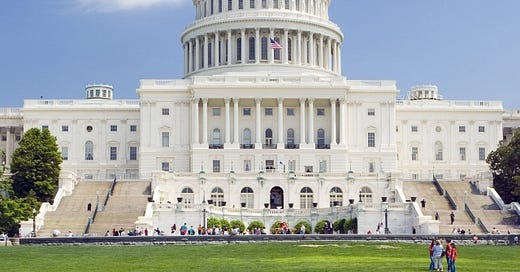



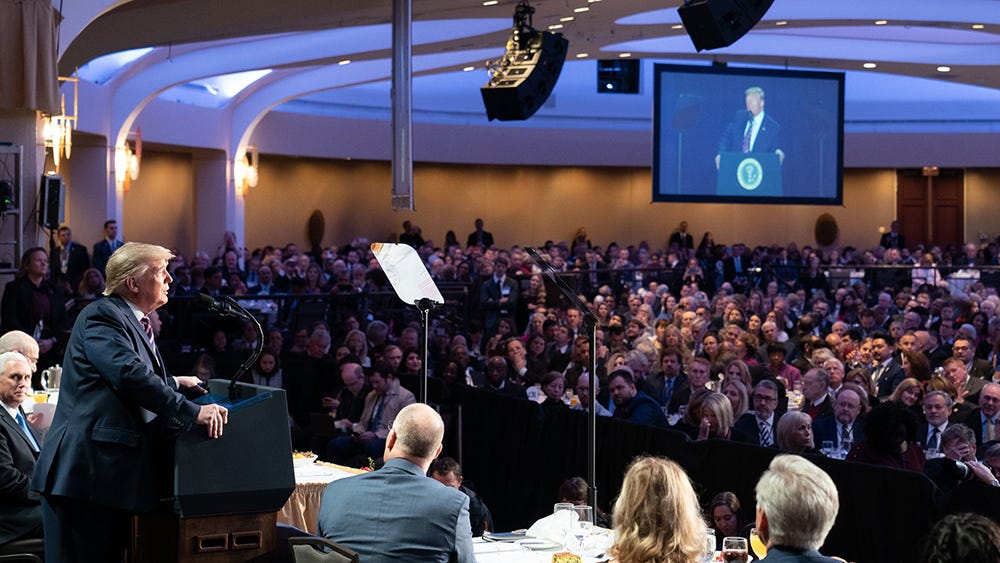
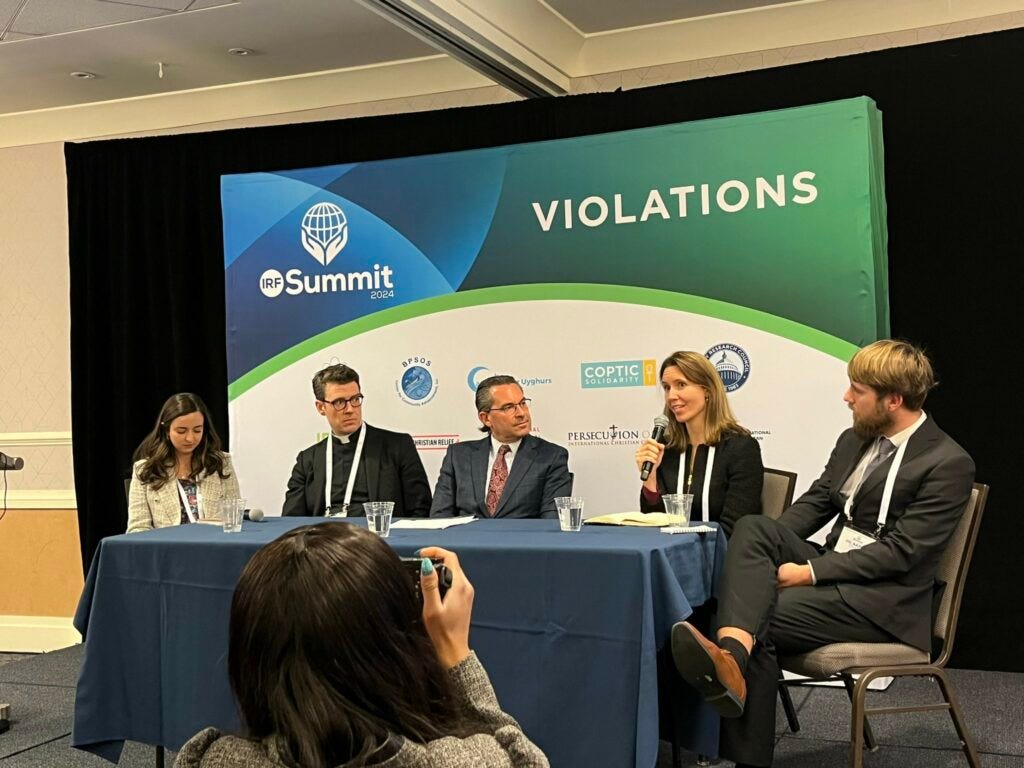
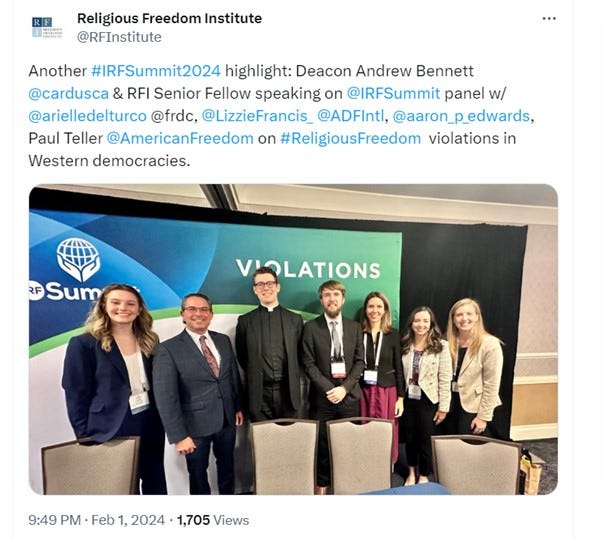
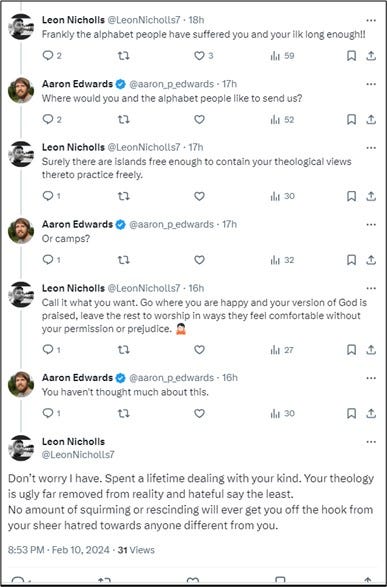
Thank you for attending and your post. We live about 2.5 hours away in West Virginia. There are many Christian leaders who do not believe in the concept of religious freedom. In the US the doctrine of religious freedom owes a great debt to Roger Williams, the founder of the colony of Rhode Island. My particular denomination (Seventh-day Adventist) has a strong history of fighting for this liberty before Congress since the 1800s. The law of God expressed on the two tables of stone was given to all. The first four represent man’s duty to God. The last six should be the governing foundation for civil law and are defensible by Scripture, history, and science. This nation was founded on two great principals: Protestantism and Republicanism (a republican form of government) and has a prophetiic role.
My prayer is for your continued diligence to the fidelity of the Bible: In faith in Christ alone, by grace alone: by the Bible alone, to the glory of God alone.